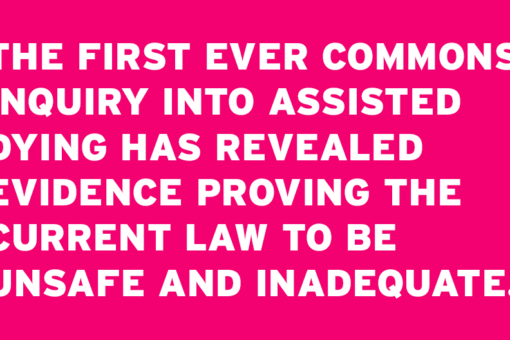Assisted dying law for UK now matter of ‘when’ not ‘if’ as first Commons Inquiry reveals compelling evidence for reform

- Majority of inquiry submissions support change in law on assisted dying, with testimony from terminally ill people and bereaved relatives overwhelmingly backing reform
- Evidence reveals palliative care cannot relieve all suffering; legalisation of assisted dying linked to improvements in end-of-life care overseas
- No ‘slippery slope’: assisted dying laws for terminally ill people found not to expand beyond original criteria
- Comes after Prime Minister and Leader of Opposition agree time needs to be made available for debate on assisted dying in Westminster, as Scotland, the Isle of Man and Jersey all expected to take steps towards legislation in coming months
The first ever House of Commons inquiry into assisted dying has today (Thursday 29 February 2024) revealed evidence proving the current law to be unsafe and inadequate, with the Health and Social Care Select Committee calling on the Government to engage in the debate as reform becomes “increasingly likely” across the British Isles.
Since the inquiry launched in December 2022, a cross-party committee of MPs has heard months of evidence, data and personal testimony outlining the many serious harms caused by the UK’s blanket ban on assisted dying. Around 60% of all evidence submitted to the inquiry was in favour of reform, while every terminally ill person involved in the committee’s roundtable sessions said that the law has to change.
Personal testimony of the impact of the current law included heart-rending accounts of terminally ill people who ended their lives in lonely and often violent ways, while others had to endure arduous and costly journeys to access legal assisted dying services in Switzerland. Significant evidence found the UK’s blanket ban on assisted dying to be “unclear”.
Evidence also revealed that palliative care is unable to relieve all suffering, with expert witnesses from the hospice sector declaring it would be “arrogant” to claim otherwise. The inquiry heard evidence that the legalisation of assisted dying has brought improvements to end-of-life care in jurisdictions overseas, with no evidence found that such care deteriorates following law change.
The inquiry report also discredits the myth of the ‘slippery slope’ with evidence confirming that assisted dying laws for terminally ill people only do not change in their scope.
Sarah Wootton, Chief Executive of Dignity in Dying, said:
“This report shifts the prospect of an assisted dying law for the UK from a hypothetical to a reality. It acknowledges that law change is coming down the track in the British Isles and rightly calls on the Government to engage in this debate. Both the Prime Minister and Leader of the Opposition accept this is a conversation we must have and have pledged to set aside time for it to be fully and fairly debated in the next Parliament.
“If MPs take just one thing from the mountains of evidence heard in this inquiry, it’s that the current law on assisted dying is unsafe and woefully inadequate. Palliative care is simply not enough to give everyone a peaceful death, forcing terminally ill Britons to contemplate taking their own lives or seek compassion in Switzerland. Maintaining the status quo in the face of so much obvious, devastating harm – while assisted dying laws continue to work safely overseas – is the most dangerous decision that Westminster could make.
“The public’s clamours for change on assisted dying are louder than ever, with the vast majority of us backing reform and thousands upon thousands rallying behind Dame Esther Rantzen’s campaign for a parliamentary debate and free vote.
“Assisted dying will be a key issue for candidates going into the General Election, and voters should watch closely for which candidates back change and which are clinging to a dangerous and unpopular law. The next generation of MPs must listen to the public mood and finally break the deadlock on assisted dying.”
A government petition launched by Dame Esther Rantzen, Dignity in Dying and the Daily Express calling for parliamentary time and a free vote on assisted dying has attracted almost 130,000 signatures in just a matter of weeks, securing a Commons debate (date to be determined) and a Government response which clarified that it would help expedite the will of Parliament on assisted dying.
Throughout the inquiry, frontline experts from countries where assisted dying is legal – including Australia and the US – provided substantial evidence showing these laws are effective and popular, benefiting from robust safeguards that protect dying people.
Even opponents of assisted dying conceded to the committee that there is a case for a tightly controlled law focused on terminally ill, mentally competent adults, such as laws that exist in Australia, New Zealand and parts of the US.
Support for assisted dying reform in the UK is overwhelming and consistent across all age groups, walks of life and political views, with large majorities of voters across all parliamentary parties indicating support, a major poll by Populus (now Yonder) in 2019 revealed.
Assisted dying bills are being considered in Scotland, Jersey and the Isle of Man, an inquiry is underway in Ireland, and a bill is expected to be introduced in France this year. Four hundred million people across Europe, North and South America and Australasia live in jurisdictions that have legalised or decriminalised assisted dying in some form.
*END*
For further information and interviews, please contact Will Harris at Boardwalk Communications at will@the-boardwalk.co.uk, or call 07976 622965.